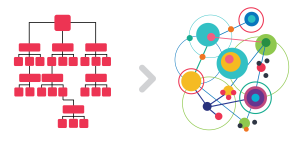Next Stage Organizations – Making Teal for Real in Business
Every generation experiences significant change due to innovations, disruptions and shifting perspectives. Yet there has been more significant and disruptive change in the last 50 years than in the previous millennium. These recent advances have created tectonic shifts challenging what we do and the way we do it, calling into question our sense of purpose, and demanding wholly new ways of operating and organizing.
Where we came from
The start of today’s dominant business paradigm coincides with the creation of the modern corporation around the turn of the twentieth century. Its roots can be traced back to the industrial revolution which grew out of the Scientific Revolution and Enlightenment of the 16th, 17th and 18th centuries, which heralded rapid advances in scientific, political and philosophical thought. This shaped a certain mind-set that influenced how we approached business management during the Industrial and post-Industrial period of the 19th and 20th century. A mind-set that included the reductive logic of empirical analysis, process management, control, predictability, replicability, efficiency, win-lose competition and economies of scale. These formed the backbone of Frederick Taylor’s Principles of Scientific Management published in 1909. The scientific approach of Taylorism became hugely influential in setting the context for viewing the organization as a machine.
Machines perform better when optimized for efficiency. The responsibility for optimizing the organizational machine became management’s domain and their primary concern. This mechanistic logic coupled with economies of scale, centralization, and control-based thinking, led to the hierarchical organization structure with its silos and bureaucracy we know only too well today. Employees were relegated to the role of efficiently performing the duties as defined by management. As management seeks to improve the efficiency of the machine, they unwittingly undermine the creativity, agility and empowerment of people in the process.
We have seen a significant rise in material betterment for large swaths of humanity over the last century. Breakthroughs in production have enhanced the lifestyle of many. Our daily lives are improved in innumerable ways from scientific breakthroughs in medicine, transportation and digitization. All of this has been made possible by significantly improving the scale and cost of production and delivery of technologies in an affordable way.
Why do we need to change if we have gained so much from this current paradigm?
Because the world of the 21st century is not like the 20th century.
The very advances brought to us by 20th century business have created a very different environment which now demands a new way of operating and organizing.
Whether it’s the increasing digitization, systemic disruptions and wicked problems, changing consumer buying patterns, brand transparency, widespread globalization, increased competition and market volatility, the need for more sustainable and responsible practices, or the impact of the Millennial generation, business-as-usual is no longer an option.
Through most of the 20th century, success was defined by the most efficient, scalable machine of production or service provision, which worked quite well in 20th century surroundings. Today’s environment is more volatile, uncertain, complex, and ambiguous, the VUCA age. Success is determined by organizations being innovative, agile, purposeful and engaged.
Businesses designed with 20th century logic will not be able to cope nor survive let alone thrive amid 21st century conditions. And yet the vast majority of organisations still apply 20th century logic – hence it’s fast time to transform our leadership and organisational logic.
Enter the case for a new way of thinking, a new mind-set beyond the ‘organization-as-machine’ mentality.
The ‘organisation-as-living-system’ is the new mentality and metaphor required for 21st century organisations that are fit for the volatile future ahead.
Living systems adapt and thrive amid unceasing transformation, ditto for tomorrow’s businesses, that as leaders we need to design into today’s organisational operating system.
What we are now seeing emerging at the juicing leading-edges of business is: A New Kind of Leading for a New Kind of World
So what does this ‘new norm’ actually mean on-the-ground, in the day-to-day thick-of-it?
Click here to go to 8 episodes of podcasts to find out more: https://totallyteal.podbean.com/
This is what we – Giles, Sarah and Chris (of The Parallax Partnership and The Future Fit Leadership Academy) – explore in the TOTALLY TEAL podcast series.
Welcome to the Next-stage organization-as-living-system.
To explore ‘the new paradigm’ further, join the Face Book community here


